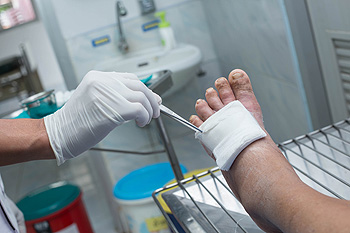Connect With Us
Blog
Sesamoid Bones and Injuries
The sesamoids are two small, pea-shaped bones found just under the base of the big toe. The sesamoids are embedded in a tendon, allowing you to move the big toes and acting as shock absorbers in the foot while you walk and run. Though these bones are quite small, they can be easily injured. The area around the sesamoid bones may become inflamed due to injury or overuse, leading to sesamoiditis. Over time, these bones may become unable to bear the load placed on them and could even develop tiny stress fractures. A sudden injury to the bones can cause them to fully fracture. If you have pain, swelling, or bruising in the ball of your foot, schedule an appointment with a podiatrist who can diagnose and treat various sesamoid injuries.
Sesamoiditis is an unpleasant foot condition characterized by pain in the balls of the feet. If you think you’re struggling with sesamoiditis, contact one of our podiatrists of Foot & Ankle Associates of Maine. Our doctors will treat your condition thoroughly and effectively.
Sesamoiditis
Sesamoiditis is a condition of the foot that affects the ball of the foot. It is more common in younger people than it is in older people. It can also occur with people who have begun a new exercise program, since their bodies are adjusting to the new physical regimen. Pain may also be caused by the inflammation of tendons surrounding the bones. It is important to seek treatment in its early stages because if you ignore the pain, this condition can lead to more serious problems such as severe irritation and bone fractures.
Causes of Sesamoiditis
- Sudden increase in activity
- Increase in physically strenuous movement without a proper warm up or build up
- Foot structure: those who have smaller, bonier feet or those with a high arch may be more susceptible
Treatment for sesamoiditis is non-invasive and simple. Doctors may recommend a strict rest period where the patient forgoes most physical activity. This will help give the patient time to heal their feet through limited activity. For serious cases, it is best to speak with your doctor to determine a treatment option that will help your specific needs.
If you have any questions please feel free to contact our office located in Brunswick, ME . We offer the newest diagnostic and treatment technologies for all your foot and ankle needs.
Swollen Ankles in Seniors
If you’re an older adult, you may have noticed swelling around your ankles. This is a common condition among seniors and is caused by fluid accumulating in the soft tissue surrounding the ankles or in the ankle joint. The swelling may be due to prolonged standing, eating a diet high in salt, sitting for extended periods of time, sustaining an ankle injury, or taking certain medications. It could also be caused by a variety of underlying medical conditions. Although ankle swelling is common, it should not be dismissed or ignored. If you have swollen ankles, it is suggested that you visit a podiatrist, who can help determine the cause of the swelling and offer the appropriate treatments.
Proper foot care is something many older adults forget to consider. If you have any concerns about your feet and ankles, contact one of our podiatrists from Foot & Ankle Associates of Maine. Our doctors can provide the care you need to keep you pain-free and on your feet.
The Elderly and Their Feet
As we age we start to notice many changes in our body, but the elder population may not notice them right away. Medical conditions may prevent the elderly to take notice of their foot health right away. Poor vision is a lead contributor to not taking action for the elderly.
Common Conditions
- Neuropathy – can reduce feeling in the feet and can hide many life-threatening medical conditions.
- Reduced flexibility – prevents the ability of proper toenail trimming, and foot cleaning. If left untreated, it may lead to further medical issues.
- Foot sores – amongst the older population can be serious before they are discovered. Some of the problematic conditions they may face are:
- Gouging toenails affecting nearby toe
- Shoes that don’t fit properly
- Pressure sores
- Loss of circulation in legs & feet
- Edema & swelling of feet and ankles
Susceptible Infections
Diabetes and poor circulation can cause general loss of sensitivity over the years, turning a simple cut into a serious issue.
If you have any questions please feel free to contact our office located in Brunswick, ME . We offer the newest diagnostic and treatment technologies for all your foot and ankle needs.
It's Time for Beautiful Feet
Why Diabetics Should Regularly Visit a Podiatrist
 Diabetes can lead to a variety of complications in the feet, including amputation. This is because diabetics tend to lose sensation in their feet which makes it difficult to notice any problems. Diabetes also leads to poor blood flow in the feet which can lead to numbness and slow the time it takes for wounds to heal. Because of this, it is important for diabetics to create a foot care routine with their podiatrist. This daily routine usually involves checking the feet for wounds or sores, washing the feet, keeping the skin soft and smooth, and protecting the feet with properly fitting footwear. Regular check ups with a podiatrist are also important. A podiatrist will be able to create a customized foot care plan, help provide suggestions on safely treating wounds, and help to provide shoes specifically for diabetics.
Diabetes can lead to a variety of complications in the feet, including amputation. This is because diabetics tend to lose sensation in their feet which makes it difficult to notice any problems. Diabetes also leads to poor blood flow in the feet which can lead to numbness and slow the time it takes for wounds to heal. Because of this, it is important for diabetics to create a foot care routine with their podiatrist. This daily routine usually involves checking the feet for wounds or sores, washing the feet, keeping the skin soft and smooth, and protecting the feet with properly fitting footwear. Regular check ups with a podiatrist are also important. A podiatrist will be able to create a customized foot care plan, help provide suggestions on safely treating wounds, and help to provide shoes specifically for diabetics.
Diabetic foot care is important in preventing foot ailments such as ulcers. If you are suffering from diabetes or have any other concerns about your feet, contact one of our podiatrists from Foot & Ankle Associates of Maine. Our doctors can provide the care you need to keep you pain-free and on your feet.
Diabetic Foot Care
Diabetes affects millions of people every year. The condition can damage blood vessels in many parts of the body, especially the feet. Because of this, taking care of your feet is essential if you have diabetes, and having a podiatrist help monitor your foot health is highly recommended.
The Importance of Caring for Your Feet
- Routinely inspect your feet for bruises or sores.
- Wear socks that fit your feet comfortably.
- Wear comfortable shoes that provide adequate support.
Patients with diabetes should have their doctor monitor their blood levels, as blood sugar levels play such a huge role in diabetic care. Monitoring these levels on a regular basis is highly advised.
It is always best to inform your healthcare professional of any concerns you may have regarding your feet, especially for diabetic patients. Early treatment and routine foot examinations are keys to maintaining proper health, especially because severe complications can arise if proper treatment is not applied.
If you have any questions please feel free to contact our office located in Brunswick, ME . We offer the newest diagnostic and treatment technologies for all your foot and ankle needs.



